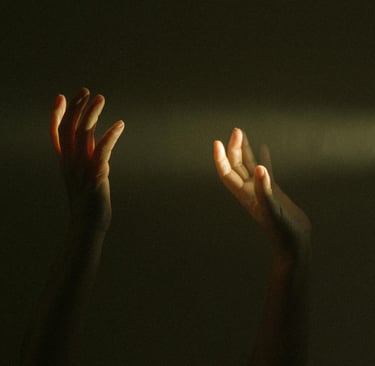Where Reiki meets Science | Gift of Hope
Explore scientific studies on Reiki energy healing, hospital use, and how it supports stress relief, anxiety, and well-being.
8/24/2025


As someone who possesses a mathematical university degree, I will always admire science. It gives order to the chaos of this world and makes things more tangible. It helps us find patterns and predict outcomes that might seem random at first glance. It also serves the purpose of calming the brain by demolishing its worst enemy – the unknown. Unfortunately, not all spiritual practices are supported by scientific research or given time for exploration, leaving a huge gap between what we categorise as ‘real’ and ‘fictional’. If I had to make a guess, a large portion of spiritual practitioners would wish for science and spirituality to go hand in hand – for holistic medicine to be recommended alongside Western medicine, instead of being written off in the blink of an eye.
When I first started energy work, I needed a lot of tangible confirmation of Spirit. I still do. I need to know that what I do has a physical form and value. That’s why I decided to look at what science has to say about Reiki Energy Healing.
Let’s start with a fascinating fact – Reiki is being used as a complementary therapy in over 800 hospitals in the USA, mainly for cancer care, surgery recovery, pain, and stress relief. But that’s not it. This energy healing has also spread to the United Kingdom, Australia, Canada, Brazil, Mexico, Northern and Central Europe, and beyond. It is most often integrated in hospices alongside massage and music/art therapy.
The majority of scientific studies are either small in scale or questionable in quality, but there are three worth highlighting.
1. Reiki & Anxiety — Guo et al., 2024
A large research review (“Reiki Therapy’s Potential Influence on Anxiety”) looked at 13 studies with 824 people. It found that Reiki may help reduce anxiety in both chronically ill patients and the general population.
👉 Results were less consistent for cancer patients before surgery or in end-of-life care.
✨ Takeaway: Reiki could be a gentle complementary tool to support emotional well-being and ease anxiety.
🔗 Read the study
2. Reiki & Quality of Life — Liu et al., 2025
An updated review (“Reiki Therapy’s Potential Contribution to Quality of Life”) included 11 studies with 661 people aged 14+. It found that Reiki may improve overall quality of life, especially with regular practice. Both short sessions (20 minutes) and longer ones (60+ minutes) showed benefits.
✨ Takeaway: Reiki can enhance daily well-being and quality of life across different age groups.
🔗 Read the study
3. Reiki & Mental Health — Zadro & Stapleton, 2022
A detailed review (“Reiki for Mental Health: A Systematic Review of Randomized Placebo-Controlled Trials”) analyzed 14 high-quality trials comparing Reiki to placebo. Results showed Reiki often worked better than placebo for certain mental health issues.
Anxiety: Strong evidence for clinically significant anxiety (less so for everyday mild anxiety). Suggested: 4 weekly sessions of 30 minutes.
Stress: Strong evidence Reiki reduces stress when levels are clinically high. Suggested: 6 weekly sessions of 30–45 minutes.
Burnout (in healthcare professionals): Moderate evidence Reiki can reduce both biomarkers and psychological symptoms. Suggested: 1–6 weekly sessions of 30 minutes.
✨ Takeaway: Reiki shows the most promise for reducing anxiety, stress, and burnout — especially with consistent sessions.
🔗 Read the study
While Reiki may not yet have the rigorous scientific backing of traditional medicine, the growing body of research suggests it may play a valuable role in supporting emotional well-being, especially when integrated alongside conventional treatments. Beyond science, Reiki has been used for thousands of years to enrich people’s lives and balance the chakra system. This makes me more than happy to share this gift with those who feel called to experience it.
Special thanks to my dear scientist friend Linas, who helped collect the research and sources for this article. Your support made this exploration possible.